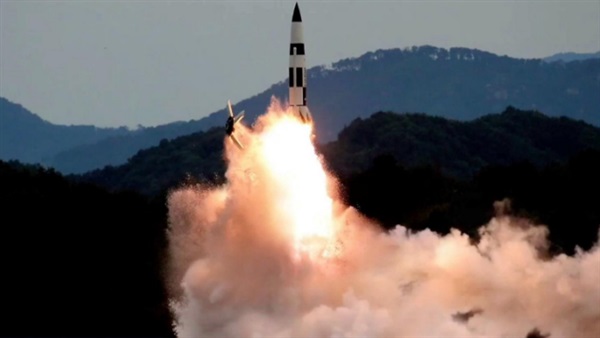US demands action over North Korea missile launches

The United
States called for a meeting of the United Nations security council tonight as
Kim Jong-un’s unprecedented missile barrage prompted fears of a nuclear
“haystack” attack on the Korean peninsular.
For the
first time in five years Washington was set to demand that Moscow and Beijing
exert pressure on Kim not to resume nuclear testing, even as officials in the
United States concede that Pyongyang is making “preparations” for such a test.
However,
with Beijing and the Kremlin at loggerheads with the other permanent members on
the council — France, Britain and the US — there was little chance of agreement
over North Korea, which has been covertly supplying Russia with a “significant”
number of artillery shells for its war in Ukraine, a conflict that China has
failed to condemn.
About 23
North Korean ballistic missiles were launched on Wednesday alone, the highest
number recorded. In a further escalation, Pyongyang also organised a mass flight
of 180 warplanes today, prompting South Korea to scramble 80 military aircraft
in response.
The launches
were a stark illustration of how Kim has modernised much of the North Korean
military, progressing from having a few old Soviet Scud missiles bought from
Egypt in the 1970s to becoming a fully fledged member of the exclusive nuclear
club.
“The greatest dangers we face from North Korea
fall into two areas: one is its artillery, which is embedded in many of the
mountains on their side of the demilitarised zone, and, more formidable, is its
nuclear-armed missiles,” said Andrew Krepinevich, a US defence analyst and
former Pentagon official.
“Given open
source information on the number of nuclear warheads in their possession — 20
or so — we could face the challenge of dealing with a haystack attack in which
North Korea launches a salvo of, say, 40 missiles but only a small number of
which are actually armed with nuclear weapons,” he said.
“Yet we would be compelled to intercept all
40, which would deplete our inventory of missile interceptors. Assuming they
have 20 nuclear warheads and they can fit them on missiles, North Korea has
enough missiles to fire several such salvoes until it finally overwhelms its
adversaries’ defences,” he said.
Growing
North Korea’s missile arsenal has been a dedicated pursuit by successive
dynastic regimes in Pyongyang, accelerated by Kim, at the expense of the North
Korean people. “From a humanitarian perspective, it’s heartbreaking to see that
what wealth North Korea has it is literally dumping into the ocean,” said Ian
Williams, deputy director of the missile defence project at the
Washington-based Center for Strategic and International Studies.
There was
nothing new in terms of technology from this week’s test launches, Williams
added. “But what was new was the volume of launches — 23 short-range and one
ICBM [intercontinental ballistic missile] which failed in its second stage,” he
said. “It shows they have a manufacturing production line that’s humming along,
so we have to assume they can amass them very quickly. This is by a country
whose GDP is on a par with Uganda.”
North Korea
has launched more than 60 missiles this year, a hypersonic missile in January
and a claimed test of its largest-ever ICBM, the Hwasong-17, with a potential
range of 9,300 miles. The size of the missile indicates that it could carry
multiple, manoeuvrable warheads.
The US said
it was actually an older Hwasong-15 but this missile still has an estimated
range of more than 8,000 miles, capable of reaching anywhere in the US if fired
on a flatter trajectory. Pyongyang has also developed submarine-launched
ballistic missiles, the Pukkuksong-4 and Pukkuksong-5, with ranges of more than
1,800 miles.
“We have to
assume they have miniaturised nuclear warheads to fit on the end of their
missiles. The technology has been around since the 1950s and 1960s, so I
wouldn’t be surprised if they mastered it themselves, although they may have
had help; there are a lot of people around the world who know how to build
nuclear weapons,” Williams said.





